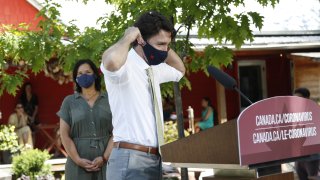
Prime Minister Justin Trudeau has turned down a White House invitation to celebrate the new regional free trade agreement in Washington with U.S President Donald Trump and Mexican President Andrés Manuel López Obrador.
Trump and López Obrador are due to meet Wednesday Washington, but Trudeau spokesperson Chantal Gagnon said Monday that while Canada wishes the U.S. and Mexico well, Trudeau won’t be there.
“While there were recent discussions about the possible participation of Canada, the prime minister will be in Ottawa this week for scheduled Cabinet meetings and the long-planned sitting of Parliament,” Gagnon said.
Trudeau is conducting online Cabinet meetings instead of in person meetings because of the coronavirus pandemic.
Get top local stories in Southern California delivered to you every morning. >Sign up for NBC LA's News Headlines newsletter.
A senior U.S. administration official, speaking on condition of anonymity because they were not authorized to be quoted by name, said Trudeau had multiple conflicts related to the start of Parliament and coronavirus regulations which require Canadians who travel abroad to quarantine for 14 days on return. The official said Trudeau has asked to speak with Trump by phone.
Trudeau later spoke with López Obrador by phone and wished him a successful meeting with Trump, the prime minister's office said.
Gagnon said the new treaty that took effect on July 1 “is good for Canada, the United States and Mexico. It will help ensure that North America emerges stronger from the COVID-19 pandemic."
U.S. & World
News from around the country and around the globe
Nelson Wiseman, a political science professor at the University of Toronto, said Trudeau has less to lose by shunning Trump now that the new treaty is in effect.
“Trudeau losses in Canadian public opinion to be seen chumming with the very unpopular Trump,” Wiseman said. “Trudeau can afford to wait out Trump's presidency now with less than four months to the U.S. election. Trudeau will still be power after the election, Trump much less likely so.”
Associated Press reporter Jill Colvin in Washington contributed to this report.



